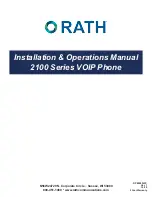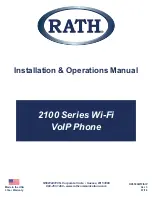
Pub. 42004-456B
GAI-Tronics Corporation 400 E. Wyomissing Ave. Mohnton, PA 19540 USA
610-777-1374
800-492-1212
Fax: 610-796-5954
V
ISIT WWW
.
GAI
-
TRONICS
.
COM FOR PRODUCT LITERATURE AND MANUALS
G A I - T R O N I C S ® C O R P O R A T I O N
A H U B B E L L C O M P A N Y
Model 352-701 and 352-703
Division 1
VoIP Telephones
Confidentiality Notice
This manual is provided solely as an operational, installation, and maintenance guide and contains
sensitive business and technical information that is confidential and proprietary to GAI-Tronics. GAI-
Tronics retains all intellectual property and other rights in or to the information contained herein, and
such information may only be used in connection with the operation of your GAI-Tronics product or
system. This manual may not be disclosed in any form, in whole or in part, directly or indirectly, to any
third party.
General Information
GAI-Tronics’ Class I, Division 1 VoIP Telephones are constructed of cast aluminum and are
weatherproof and corrosion resistant. User operation is identical to that of a standard analog telephone—
simply lift the handset and dial the desired telephone number.
GAI-Tronics’ VoIP Telephones are designed for connection to a 10/100 BaseT Ethernet, and operate
from either Power-over-Ethernet or an external power source. The VoIP Telephones provide point-to-
point communications between personnel throughout a facility over an existing LAN.
This manual applies to the following models:
Model 352-701 Division 1 VoIP Telephone
Model 352-703 Division 1 VoIP Telephone with Headset
In addition to providing standard telephone operation, the VoIP
telephones feature real-time alarm reporting enabling system
supervisors to monitor the telephones’ activity and address
caller needs or maintenance issues immediately. Also, four
user-configurable inputs and two outputs have been provided
for peripheral control.
System Requirements and Limitations
GAI-Tronics VoIP Telephones require Power-over-Ethernet or
a local 48 V dc power source for operation. Two VoIP
telephones can be connected in a peer-to-peer configuration
without the need for a LAN, however, a 10/100 BaseT Ethernet
with SIP server is required for systems containing three or more
VoIP Telephones. Conferences are limited by the customer’s
LAN media capabilities and the services available at each end
point.
Figure 1. Model 352-701 Division 1
VoIP Telephone


































